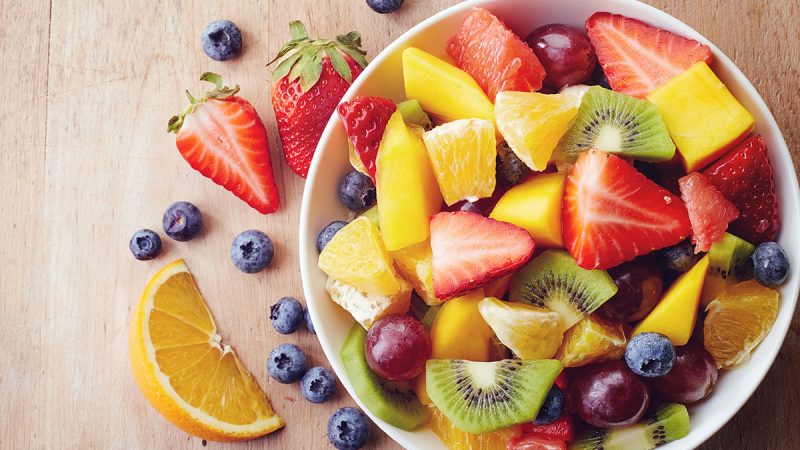Surprising Side Effects of Not Eating Fruit

If your idea of fruit is sugar-coated Froot Loops or a bottle of 5% "real fruit juice," you're missing out on an orchard full of good nutrition—vitamins, minerals, fiber, flavonoids, polyphenols, and other unfamiliar-sounding compounds that are actually incredibly good for you. You're also setting yourself up for some unwelcome side effects when that fruit bowl on your kitchen counter is empty.
Fruit is a sweet treat, which may be why you're avoiding it—the fructose, you know, natural sugar. Bad. Right? Not at all. Or maybe you're just not eating fruit because you think it's too expensive or goes bad too quickly, so it isn't worth your time or money to put it on your grocery list. But let us prove you wrong.
Fruit is a high-fiber, antioxidant-rich super plant food. The American Heart Association recommends eating 4 to 5 servings of fruit every day. The American Cancer Society's nutrition guidelines for cancer prevention advocate including fruits (and vegetables) with every meal and for snacks.
1. Weight gain
The danger with cutting out an entire food group like fruit is replacing it with something less healthful. If you're filling up on vegetables instead of fruit, that's a good choice. But what if a lack of fresh fruit to satisfy your hunger nudges you toward the fast-food drive-thru?
It's not just the fact that fruit displaces unhealthy foods that make them good weight-loss foods. Fruit is rich in water and fiber, which helps us feel full and can stop us from overeating. A study in the journal Appetite demonstrated just that when researchers compared how consuming an apple, applesauce, and apple juice before a meal influenced satiety. Results showed that eating the apple before lunch reduced food intake by 15% or about 187 calories and affected satiety much more than the pureed fruit or the juice—all due to the fiber in the solid fruit.
2. Sore muscles
You know how your muscles feel 12 to 48 hours after strenuous exercise, but do you know it has a name? DOMS. It stands for Delayed Onset Muscle Soreness. If you avoid eating fruit (for example, if you're following the low-carb keto diet and don't even eat low-carb fruits), you could make your DOMS worse and longer-lasting.
The best fruits for reducing DOMS seem to be berries and cherries. One study in the Journal of the International Society of Sports Nutrition found that blueberries effectively reduced inflammation and exercise-induced muscle damage from a strenuous leg workout. In the experiment, 10 women drank either a blueberry smoothie or a placebo 5 to 10 hours before a workout and another 12 to 36 hours after the exercise. By measuring blood biomarkers of oxidative stress and antioxidant capacity up to 60 hours after exercise, researchers found that the blueberry smoothie accelerated muscle recovery to speak strength, with a faster decrease in oxidative stress occurring at 36 hours post-exercise. Other research noted in Antioxidants in Sport Nutrition involving runners suggests tart cherry juice minimizes post-run muscle pain, delays time to fatigue, and promotes muscle recovery.
3. Hypoglycemia
Fatigue and lightheadedness are common symptoms of low blood sugar, or hypoglycemia, during exercise. By avoiding fruit, you are missing out on one of the easiest, quickest ways to top off the fuel (glycogen) in your muscle that you'll need to power through your workout full of energy. Fruits are a good source of healthy carbs, which makes them a great source of quick fuel that won't leave you feeling bloated when you start exercising. And because fresh fruit also contains fiber, it's unlikely to cause blood sugar spikes, followed by a crash.
4. Strong cravings
Cravings for sweets are an interesting and often overlooked side effect of not eating enough fruit. "A prime example is seen in chocolate cravings," says Trista Best, RD, a registered dietitian at Balance One Supplements. "Chocolate contains a significant amount of magnesium as do fruits like bananas and avocado. When the body is lacking magnesium, you will begin to crave chocolate." Fruit contains micronutrients and plant compounds that the body needs for proper function and optimal health. "When we do not take in these nutrients from fruit, we could be creating a nutrient deficiency," she says, one that can spur cravings for less healthy foods.
5. Exercise-induced respiratory problems
Athletes on a fruitless diet may experience more respiratory problems, including an exacerbation of exercise-induced asthma, according to studies highlighted in Antioxidants in Sports Nutrition. The research suggests that athletes on a high-antioxidant diet may be protected against training- and pollution-induced inflammation of the airways. Of course, vegetables also can supply those powerful inflammation-fighting antioxidants, but experts recommend eating a wide range of whole foods—both fruits and vegetables—to gain the greatest variety of nutrients.
6. An unhealthy gut
Your gut is teeming with microorganisms—helpful and harmful—that affect your digestive health and your immune system. Without the fiber and plant-based micronutrients called polyphenols you get from eating fruits and vegetables, your gut microbiota can become imbalanced. Scientists believe the disruption of this fine microbiota balance plays a role in many disorders and diseases, including allergies, cardiovascular disease, metabolic syndrome, diabetes and obesity. But it's easy to rebalance your gut. One study found that women who ate two apples a day increased the amount of good bacteria in their intestines in as few as two weeks. The researchers credit the pectin found in the peel of apples with the improved microbiome.
7. Gas, bloating, constipation and more
Other potential side effects of having your gut microbiome overrun with unhealthy bacteria from not eating fruit fiber are gastrointestinal issues ranging from nausea to reflux, where gastric acids irritate the esophagus. "The fiber found in fruit acts as a prebiotic in the gut by feeding the good gut bacteria," says Best. Too much bad bacteria results in gas, bloating, constipation and even chronic inflammation in the body, which can affect your immune system and cardiovascular health. But "consuming as little as 2 servings of fruit a day can mitigate many of these issues and improve overall health and well-being," says Best. If you don't enjoy eating fruit, it may help to pair a banana with peanut butter or blend a variety of berries into a smoothie, or enjoy baked apples with cinnamon, she suggests.
8. Muscle cramps and high blood pressure
These two problems may seem unrelated, but they can both be exacerbated by low levels of potassium in your body. Potassium relaxes blood vessels, which in turn lowers blood pressure, reduces stroke risk, and fends off muscle cramping. Fruit is a prime source of potassium. You'll get the most from bananas, oranges, melons, grapefruit, and dried fruits like prunes and dates. If you don't get your potassium from fruit, you'll want to make sure you eat a lot of vegetables to get enough of this important nutrient. Another component of certain fruits can help lower blood pressure as well—flavan-3-ols, a group of compounds that improve vascular function, according to a study in the United Kingdom. You'll get the most from apples, grapes, pears, and berries.
9. Aging skin
Avoiding fruit means you're avoiding antioxidants, vitamins, and minerals that are crucial to skin health. "Imagine not eating berries which are loaded with Vitamin C which help with collagen repair and boost immunity," says registered dietitian nutritionist Vanessa Rissetto, RD, co-founder of Culina Health. Collagen is a protein that gives your skin structure and plumpness.
Though an advocate of fresh fruit, Rissetto offers a word of caution: "I think when WW assigned zero points to fruit it made it seem like you could eat as much fruit as you wanted without it making an impact," she says. "However, too much fruit could cause issues with blood sugar, so we just want to understand how the fruit affects our blood sugar and ways to stabilize our glucose levels when eating it."
The post Surprising Side Effects of Not Eating Fruit appeared first on Eat This, Not That.

